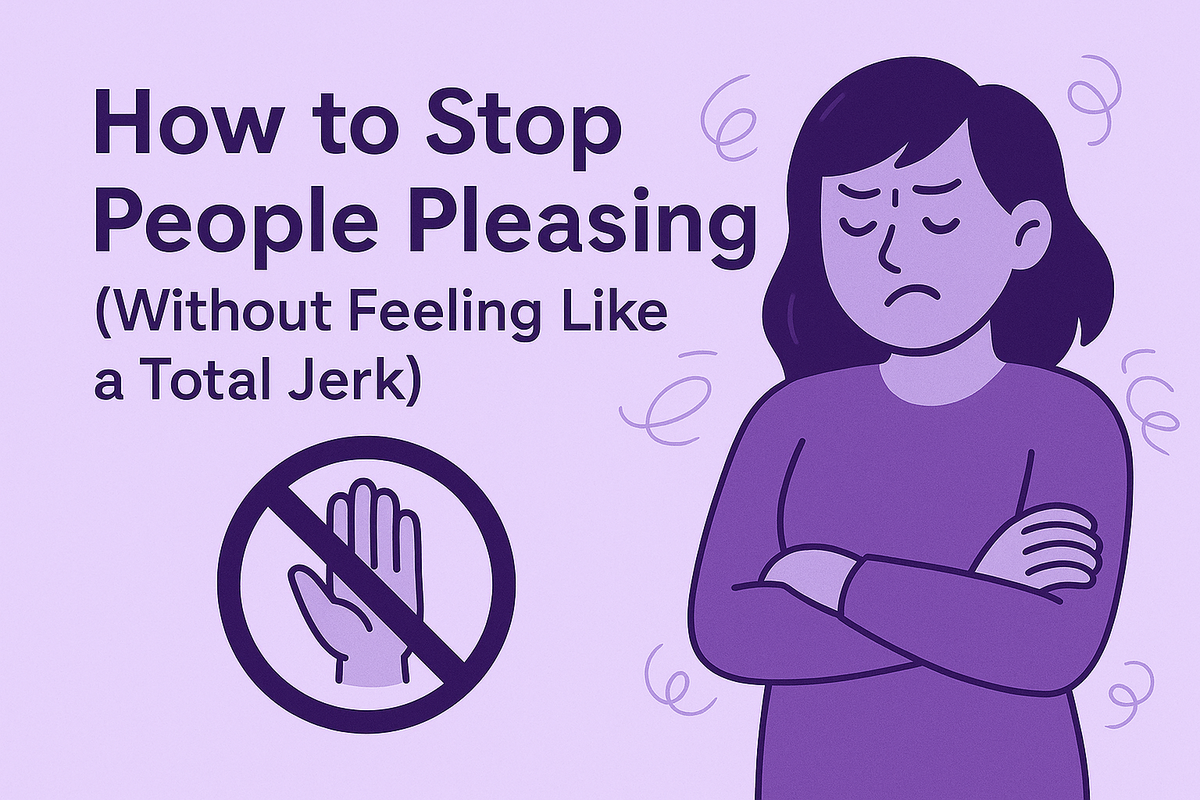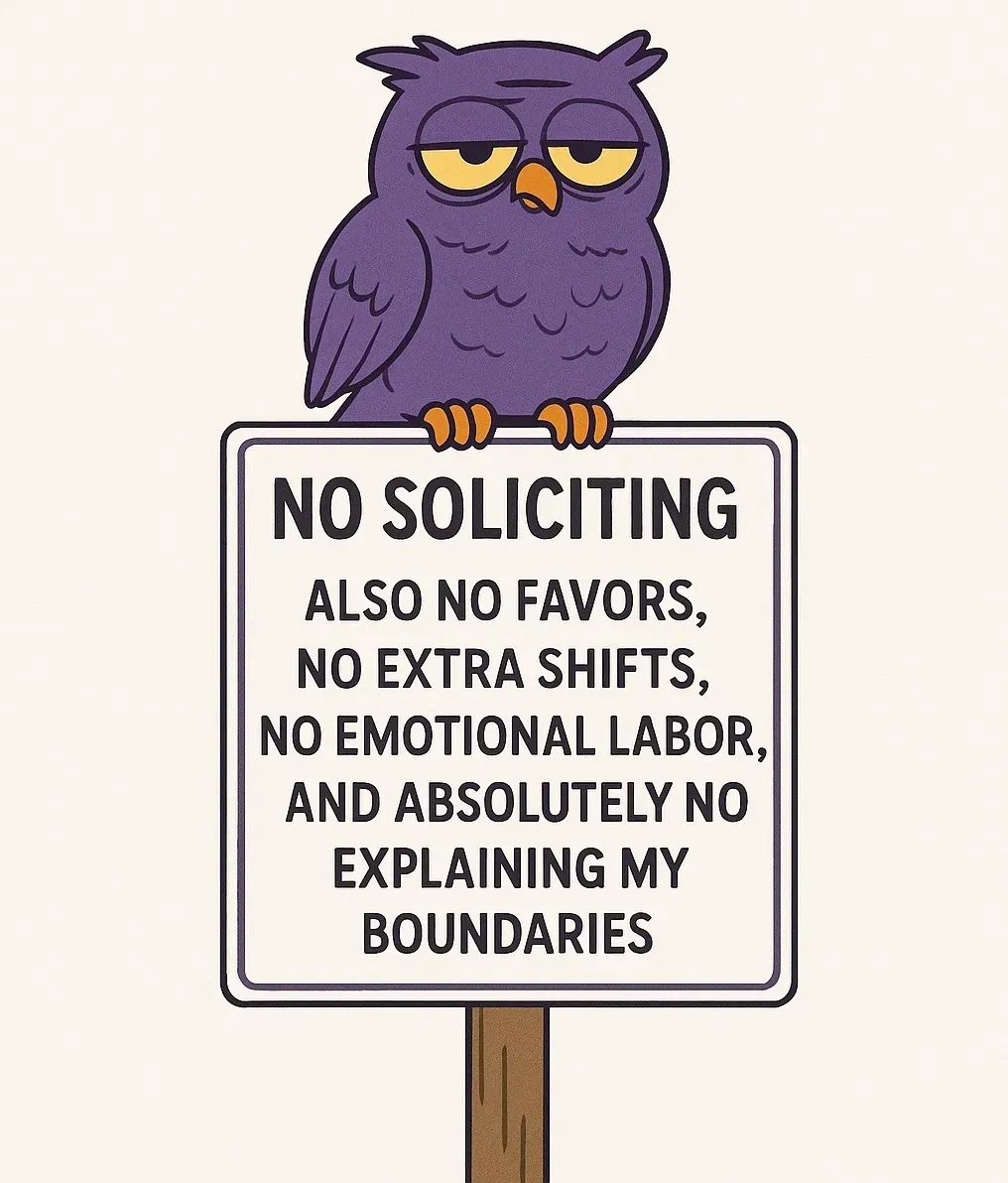How to Stop People Pleasing (Without Feeling Like a Total Jerk)

The Burnout Behind the “Yes”
Confession time: anyone else just not reply to a text or email so you don’t have to say no? Yep. It’s me. Hi. I’m the problem.

Honestly, I could be the poster child for people-pleasing. Fear of disapproval? Check. Zero boundaries because… what even are those? Yep. A deep need for validation, trauma responses disguised as “being nice,” and a strong aversion to conflict because my nervous system short-circuits at the first sign of tension? All present and accounted for.
But here’s the not-so-fun part they don’t tell you: constantly putting everyone else first doesn’t win you any awards. It just gets you a fast pass to resentment, burnout, and a whole lot of self-abandonment. And the ironic twist? The relationships you bend over backward to maintain—often end up crumbling anyway. Because there’s no foundation when you’ve been too busy shape-shifting.
Why We People-Please in the First Place
People-pleasing doesn’t just show up out of nowhere like a stray cat at your back door. It’s something we learn. And for a lot of us? We learned it early.
Personally, I think I picked it up the same way I learned to microwave leftovers or avoid stepping on that one squeaky floorboard—by watching the grown-ups around me. I saw my people shrink themselves, overextend themselves, and “yes” themselves into exhaustion. I didn’t know it had a name. I just thought being selfless and agreeable was how you survived. Especially if you were a girl.
And then there’s the guilt. Ohhh, the guilt. I said “no” once—just once!—and immediately spiraled into an internal apology tour. It’s wild how deeply rooted that “you should feel bad for having needs” belief can be.
Let’s not forget the old-school messaging a lot of us got growing up:
“Be sweet.”
“Don’t make waves.”
“Women should be polite and supportive and stand in the back, quietly clapping while everyone else lives their best lives.”
Cool, thanks—but hard pass.
All of this builds up into a perfect storm of:
- Saying yes when we mean no
- Over-explaining ourselves to death
- Feeling responsible for other people’s emotions
- Being praised for our “kindness” while quietly burning out in the background
Truth is, people-pleasing is often a trauma response. A nervous system reflex. A way to avoid conflict and keep the peace—especially if conflict never felt safe growing up. But just because it’s learned doesn’t mean we can’t unlearn it.
5 Sneaky Signs You Might Be People-Pleasing (And Not Even Know It)
People-pleasing isn’t always loud or obvious. Sometimes it wears a polite smile, nods a lot, and says, “No worries at all!” while silently spiraling inside. If any of this sounds familiar, you might be deep in the people-pleaser trenches:
1. You apologize. A lot.
Like… a lot a lot. I used to apologize for everything—bumping into furniture, asking a question, breathing too loud. At one point, I realized “I’m sorry” came out of my mouth more often than my actual opinion. I’ve improved, sure, but it’s still a reflex. Because somewhere along the way, I learned that taking up space or causing any inconvenience meant I was doing something wrong.
2. You agree to avoid awkwardness.
I cannot tell you how many times I’ve nodded along just to keep things smooth—knowing full well I didn’t agree at all. Why? Because disagreeing meant confrontation, and confrontation meant discomfort, and guess what my nervous system doesn’t handle well? Yep. Discomfort.
3. You say yes… when you really don’t want to.
You’re exhausted, overbooked, mentally checked out—and yet, there you are, agreeing to one more thing because the thought of disappointing someone makes your stomach turn. Saying no feels like setting the building on fire. So you whisper a yes and light yourself on fire instead.
4. You downplay your needs or preferences.
“I’m easy!” “Whatever works for you!” “I don’t mind!” (Translation: I do mind, I just don’t want to make it weird.)
You’ve learned to make yourself small so other people don’t have to adjust. Spoiler alert: that’s not flexibility. That’s fear in a friendly costume.
5. You feel responsible for how other people feel.
If someone’s upset, it must be your fault. If someone’s uncomfortable, you should fix it. You try to manage other people’s emotions like it’s your full-time job, even if it means ignoring your own entirely.
People-pleasing isn’t just about being “nice.” It’s about survival strategies we learned that once kept us safe—but now keep us stuck. Recognizing the signs is the first (huge) step toward unlearning them.
How to Stop People-Pleasing (Step-by-Step)
So… you’ve realized you’re people-pleasing. Now what? Do you immediately become a boundary-setting badass overnight? LOL, I wish.
But here’s the truth: unlearning takes time. It’s uncomfortable. And you’ll probably still overthink your texts and rehearse your “no” in the mirror 5 times before sending it. But you can get better at this. Here’s how:
1. Pause Before You Say Yes
Instead of blurting out a yes, try this magic phrase:
“Let me get back to you.”
You don’t owe anyone an instant answer. Give yourself space to check in with you—not your anxiety, not your guilt, not your childhood conditioning.
2. Expect Guilt—and Keep Going Anyway
Guilt doesn’t mean you’re doing something wrong. It usually just means you’re doing something different. Your brain is used to equating “no” with rejection, danger, or being the worst human alive.
Let it freak out. Then calmly do the thing that aligns with your actual values—not just the ones programmed into you.
3. Start Small (Like, Really Small)
You don’t have to launch into your new boundary era by saying no to your boss or cutting off your entire family. Try this instead:
- Don’t answer the phone if you’re not mentally up for it
- Say, “Actually, I can’t help with that today” without apologizing
- Say “no thank you” and leave it there. No TED Talk explanation required.
4. Write Out Your Boundaries
Sometimes boundaries feel fuzzy because we’ve never really defined them. Try journaling:
- What am I no longer available for?
- What drains me?
- What do I need more of in my relationships?
5. Let People Be Disappointed
This is the hardest one, hands down. You will say no. Someone might not like it. You’ll feel the urge to fix it. But don’t.
Let them have their feelings. Your job isn’t to micromanage other people’s reactions—it’s to stay in integrity with yourself.
The Emotional Side of It
No one tells you this part:
Unlearning people-pleasing doesn’t just free up your calendar. It messes with your entire identity.
Because when your worth has been wrapped up in being agreeable, helpful, and low-maintenance, setting boundaries feels like betrayal—even when it’s the healthiest thing you’ve ever done. You’re not just saying “no.” You’re grieving the version of yourself who thought she had to always say yes to be loved.
It’s weird. You finally stand up for yourself and instead of feeling powerful? You feel like a jerk. An ungrateful, cold, emotionally unavailable jerk. (You’re not, by the way. That’s just your old guilt flaring up like a pulled muscle.)
And then comes the silence. The tension. The shift in dynamics when people who were used to the old you don’t know how to handle the new one who doesn’t jump to make everything okay.
Some drift away. Some pout. Some double down with guilt trips. It sucks.
But the truth is, that ache you feel? That’s not selfishness. That’s growth pain. It’s the discomfort of choosing yourself for the first time in a long time.
Healing isn’t always empowering. Sometimes it’s just… quiet. Sometimes it looks like crying in your car because you told someone no and now your stomach hurts and your brain is convinced they hate you forever.
And then, one day, you say no again—and it hurts less. You apologize less. You trust yourself more. And you realize: this version of you might be harder to love for people who only valued your compliance—but she’s finally learning to love herself.
Encouragement for the Recovering People-Pleaser
If you’ve made it this far, first of all—I see you.
You are allowed to disappoint people and still be a good person.
You are allowed to set boundaries and still be kind.
You are allowed to say no without offering a five-minute monologue and a coupon for emotional damages.
You’re not broken because you care too much. But you do deserve a life that isn’t built around managing everyone else’s comfort at the expense of your own.
Healing this pattern isn’t about becoming cold or distant. It’s about becoming honest. It’s about finally listening to that tired, stretched-thin version of yourself that’s been whispering, “Please stop abandoning me.”
So take the baby steps. Say no and let your hands shake. Pause before you commit. Practice guilt tolerance like it’s your new favorite workout.
And if no one’s told you lately? You’re doing just fine. It’s okay if you still slip into old patterns sometimes. Growth isn’t linear—and healing doesn’t require perfection. It just asks for consistency, courage, and a whole lot of self-compassion.
This version of you? The one who honors her needs, who chooses peace over performance?
She’s not too much. She’s just finally enough—for herself.
By: Jess E

